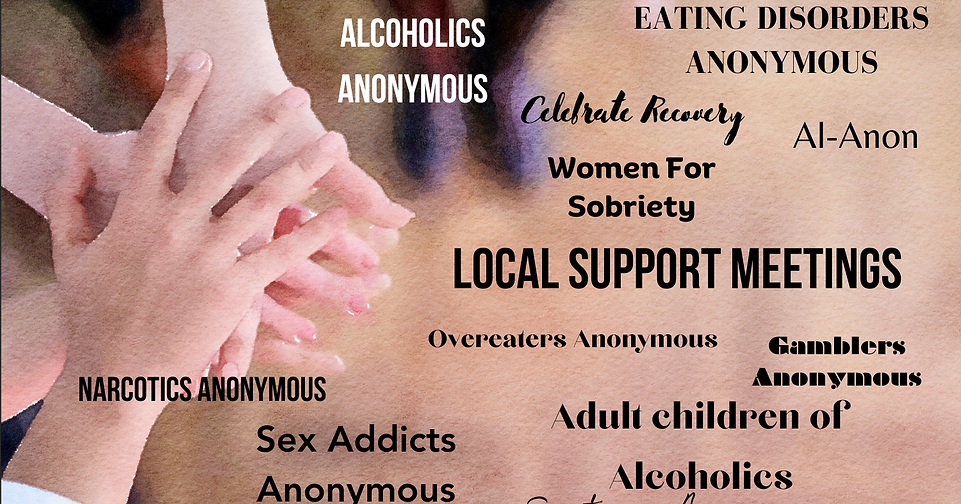
12-Step Support Group Meetings Offer Recovery Resources
By Peggy L. Ferguson, Ph.D.
Pursuing recovery from addiction can be a formidable challenge, but the path becomes more navigable when shared with others who understand the struggles firsthand. Support groups with a 12-step foundation, such as Alcoholics Anonymous (AA) and Narcotics Anonymous (NA), offer a unique and supportive community for individuals seeking recovery. The benefits of participating in these groups extend beyond mere abstinence, fostering a holistic approach to personal growth and healing. In this collaborative environment, individuals find solace, understanding, and inspiration, creating a robust foundation for lasting recovery. Joining a 12-step group isn't just about overcoming addiction; it's about embracing a transformative journey alongside others who share the same commitment to change.
Beyond substance use disorders, the ripple effect of the 12-step model has given rise to a myriad of support groups addressing a spectrum of addictive behaviors. Drawing inspiration from the success of Alcoholics Anonymous (AA), these groups have formed a tapestry of recovery, offering hope and healing to individuals grappling with diverse challenges. Whether the struggle is with process addictions or compulsive behaviors, the 12-step framework has proven to be a guiding light. From Overeaters Anonymous and Eating Disorders Anonymous, guiding those seeking solace from the tumultuous relationship with food, to Gambling Anonymous (GA) and Debtors Anonymous, assisting individuals in regaining control over financial compulsions, these groups exemplify the adaptability of the 12-step model.
For sexual addiction, Sex Addicts Anonymous (SAA) and Sexaholics Anonymous provide support and guidance for recovery. Meanwhile, the digital age has given rise to groups like Online Gamers Anonymous, recognizing the prevalence of gaming addictions and offering a community for gamers striving for balance. The intricate web of 12-step groups extends even further, embracing a diversity of challenges, each embodying the principle that recovery flourishes in the shared experience of those who have walked similar paths.
This rich recovery landscape of the 12-step philosophy has become a universal compass, guiding individuals toward self-discovery, acceptance, and transformation. Together, these groups echo the resounding message that, regardless of the specific addiction, there is strength, support, and healing in the fellowship of those who understand.
A List of 12 Step Organizations
Underlined text is linked to the organization website listed.
AA - Alcoholics Anonymous
ACA - Adult Children of Alcoholics
CA - Cocaine Anonymous
CLA - Clutters Anonymous
CMA - Chrystal Meth Anonymous
CoDA - Codependents Anonymous
COSA - Co-Sex Addicts Anonymous
COSLAA – CoSex and Love Addicts Anonymous
DA – Debtors Anonymous
EDA - Eating Disorders Anonymous
EA – Emotions Anonymous
FA – Families Anonymous
FA – Food Addicts in Recovery Anonymous
FAA – Food Addicts Anonymous
GA – Gamblers Anonymous
Note: To download Adobe Acrobat Reader for free, click here .
-
HA – Heroin Anonymous
-
LAA – Love Addicts Anonymous
-
MA – Marijuana Anonymous
-
NA – Narcotics Anonymous
-
Nar-Anon - Nar-Anon Family Groups
-
OA – Overeaters Anonymous
-
SA – Sexaholics Anonymous
-
SAA – Sex Addicts Anonymous
Exploring the Benefits of Non-12-Step Paths
By Peggy L. Ferguson, Ph.D.
Many people seeking recovery prefer an approach that doesn't involve religion or spirituality. Traditional twelve-step groups are usually based on spiritual principles that do not resonate with everyone. The good news is that there are non-religious, non-spiritual alternatives that actively promote and support recovery.
There are non-12-step groups that are not based on a belief in a higher power and others that eschew "spirituality" for "religion." Secular approaches are more accessible to individuals not attracted to a religious or spiritual perspective. These groups prioritize inclusivity, recognizing and respecting diverse beliefs and backgrounds. The emphasis here is on personal responsibility, fostering self-empowerment, and autonomy.
Many of these groups draw on well-established therapeutic techniques for recovery. Some even set goals that are not based on abstinence, embracing concepts like moderation management. Like traditional twelve-step groups (i.e., AA, NA, Al-Anon), non-12-step groups provide a crucial support system, encouragement, and a sense of belonging. Non-12-step groups may cater to specific needs and preferences. There are specialized groups like Caduceus meetings, Nurses Helping Nurses, Pharmacists Helping Pharmacists, and local support groups tailored to particular illnesses (e.g., Bipolar Support Group.) Like their traditional counterparts, non-12-step groups adapt to contemporary demands, offering various formats such as online sessions, in-person meetings, and discussion-based gatherings.
Non-12-step groups offer valuable support and recovery solutions for those seeking alternatives to spirituality-based programs. They assist with recovery practices, encourage personal responsibility, champion inclusivity, and empower individuals on their unique recovery journeys.
Alternative Support and Recovery Groups

We are all in
this
together.